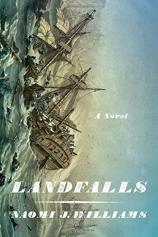Reading Group Guide
Discussion Questions
Landfalls

1. In the prologue and the opening chapter, what do we learn about the purpose of the French expedition and the state of relations between France and England? What is the significance of the galley stoves? Why does the naval engineer Monneron lie about who he is working for? In his meetings with Sir Joseph Banks and the artist John Webber is there any foreshadowing of the ultimate fate of the expedition?
2. Jean-Honoré-Robert de Paul, Chevalier de Lamanon, who likes to be called “chevalier,” and who is nicknamed Monsieur de Lamentation by his shipmates, is a memorable character, a tragic and comic figure. What are the flaws in his personality that lead not only to his death but, ultimately, to the loss of his legacy as a scientist? Do you see him as a dedicated and brilliant man of science or as a self-important, insubordinate bumbler?
3. Lapérouse and Langle, the captains of the Boussole and the Astrolabe, are experienced leaders and honorable men. How do they differ in their approaches to their work? What are their strengths? Their shortcomings? Who do you think is wiser? More softhearted? Better liked? Both were qualified to lead the expedition. Why was Lapérouse chosen?
4. LANDFALLS tells the stories of many complex men and women, each with desires, jealousies, worries, ambitions and frailties. Which of the characters do you most admire? Who do you feel sorry for? Who do you dislike?
5. The novel begins with three epigraphs, one a quote from Captain John Smith: “A good Land fall is when we fall just with our reckoning, if otherwise, a bad Land fall.” Based on this measure, can any of the stops made by the expedition be considered “good Land falls”?
6. Each chapter is told from a different point of view, encompassing not only members of the crew but also the people they encounter in various locations around the globe. What are the advantages of this type of narrative? In the end, does it confuse or deepen our understanding of events? What insights do we gain by hearing the same story told by more than one person?
7. In each of the Spanish colonies visited by the expedition, Lapérouse meets women who are married to powerful men --- Eleonora in Concepción and Doña Eulalia in Monterey. What are his feelings toward each of them? What details about them are missing from his understanding of their circumstances? How accurate a picture do you think he has of what his own wife’s life is like?
8. The fog the ships encounter in Chapter 6, on course between Alaska and California, is as much a symbol of the men’s grief over the loss of 21 shipmates as it is real. Monsieur Lavaux, the physician on the Astrolabe, is concerned about the low spirits of the crew and especially the captain. He gives as his prescription for recovery the elements of light, warmth, visibility and color. What are other periods of doubt or despair (fog) on the voyage? What are the moments that offer relief?
9. What does the story of the millstone in Chapter 7 reveal about European attitudes toward the indigenous people of the Americas and the South Pacific? How do the Spaniards see themselves and their mission? How do the French see the Spaniards?
10. In Chapter 10, Vaujuas is the officer charged with writing the report about the massacre on an island in the Navigators Archipelago. As the sole author, he has the power to alter the truth to serve his own purposes. Does he do this? Is there evidence that his dream, at the end of the chapter, contains more truth than his report?
11. In Chapter 11, Father Receveur’s death is presented as a mystery story. We hear from several unreliable witnesses when the priest died and each of them has a theory about what happened. Based on the final section of the chapter --- Father Receveur’s journal entry --- what is the most likely explanation for how he died? How did the personal bias of each witness obscure the truth?
12. The last words in Father Receveur’s journal are about mangrove trees and how they are able to shed salt through their leaves in order to survive. He writes, “If only men could do this --- shed from their bodies and their selves the things that would destroy them.” What things might the men of the expedition need to have shed for their story to have had a different ending?
13. What effect does seeing the relics discovered by Peter Dillon have on Lesseps? Besides the objects brought home by Dillon, are there any other “relics” of the voyage? Why is Lapérouse’s sister obsessed with correcting the spelling error on the document that grants her family permission to use his name?
14. The epilogue is titled “Folie à Plusieurs,” which refers to a condition also known as folie à deux, or shared madness. Do you agree that LANDFALLS is a tale of madness, the men victims of the madness of a French king who wants to prove that his nation is as great as its rival? Or was their shared experience of the voyage, along with its modest accomplishments, enough to justify their fate?
15. Have you ever had an experience that in any way compares to that of the men on the Boussole and Astrolabe? A long trip where everything went wrong? An extended period of homesickness or loneliness? Feelings of intense grief or intense connection to another person? In times of uncertainty, are you more like Lapérouse or Langle --- an optimist or a worrier?








